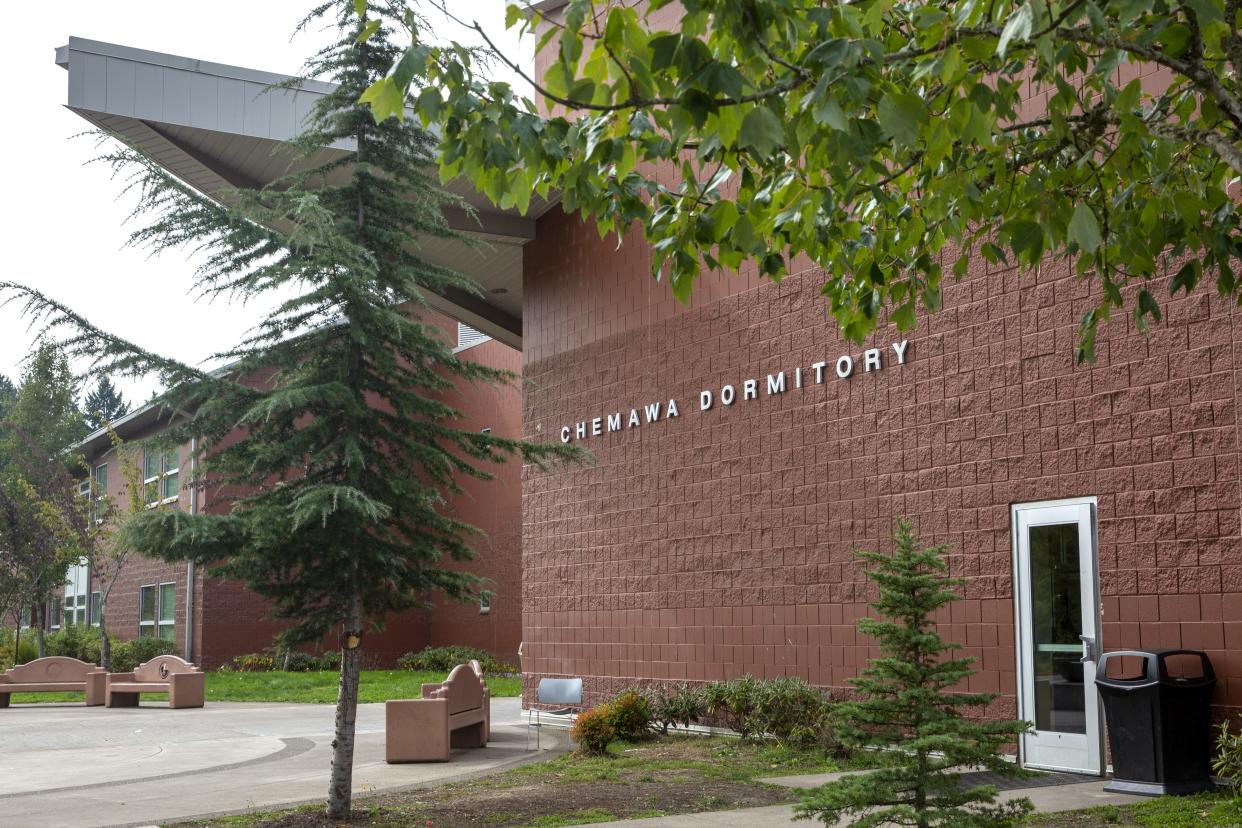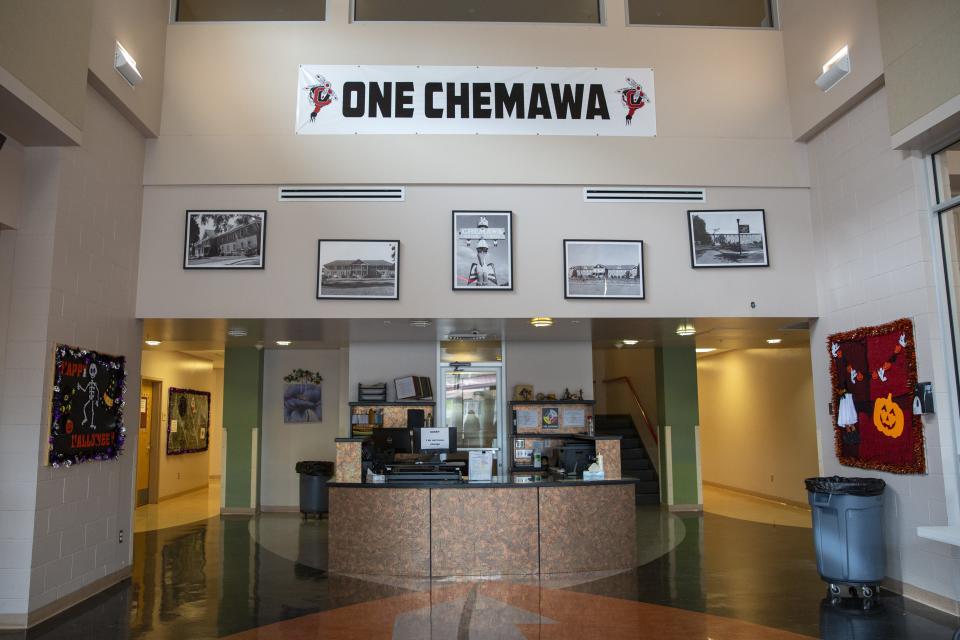Chemawa Indian School mishandled funds, including student account, federal audit finds

- Oops!Something went wrong.Please try again later.
- Oops!Something went wrong.Please try again later.
The U.S. Department of Interior's Office of Inspector General made 26 recommendations to the Bureau of Indian Education and Chemawa Indian School after a federal audit found financial mismanagement at the Salem boarding school.
Specifically, the office found Chemawa staff did not follow policy when managing school funds and that the BIE did not provide adequate financial oversight.
The 67-page audit, released Tuesday and first reported by Oregon Public Broadcasting, says the Office of Inspector General will report findings to Congress and report semiannually on actions taken to implement the recommendations and on recommendations that have not yet been implemented. It says actions or inactions will be tracked but does not specify how that will be done.
Chemawa is the federal government's oldest, continuously operating boarding school for Native American students in the country and one of 55 schools operated by the Bureau of Indian Education.
Federal Indian boarding schools have troubled legacy
Native American boarding schools have a dark history, and Chemawa is no exception.
The school is located east of Keizer Station and Interstate 5. It moved to Salem in 1885 from Forest Grove, where it was the first school of its kind on the West Coast.
Families often were forced to send their children to these schools, where they were forbidden to speak their Native languages. The schools are known today for decades of abuse, disease, secrecy, trauma and deaths.
Only recently has the U.S. government sought to investigate that history. In May 2022, the Department of the Interior and the Bureau of Indian Affairs released Volume 1 of an investigative report called for as part of the Federal Indian Boarding School Initiative, an effort to address the troubled legacy of federal Indian boarding school policies and the intergenerational trauma they caused.
'Opaque financial practices' prompt audit
The audit of Chemawa Indian School was initiated after the Inspector General's Office received a congressional request in 2021 and after conducting its own independent analysis of the issues.
U.S. Sen. Ron Wyden and U.S. Sen. Jeff Merkley, both Oregon Democrats, sought a review of the school's accounting practices and policies on Oct. 25, 2021.
“In the six years that have passed since your office’s review, we have continued to receive complaints about alleged financial mismanagement at the school,” the senators wrote Interior Inspector General Mark Greenblatt in their 2021 request. “These allegations have been difficult to evaluate due to the school's opaque financial practices.Our offices have repeatedly asked school officials for basic financial data. To date, we have not received a satisfactory response to those requests."
The report reveals Chemawa did not accurately track or use its financial resources during the 2019-2021 fiscal years, using more than $500,000 in federal money on "inappropriate" items, failing in managing leases for its land and not following regulations for school donations.
The title page of the final report summarizes the findings this way: “The Chemawa Indian School Did Not Account for Its Financial Resources, and the Bureau of Indian Education Did Not Provide Financial Oversight."
BIE was provided a copy of a draft of the report, according to the OIG. When it was provided is unclear. The BIE agreed with 25 recommendations and labeled them as resolved. One recommendation remained unresolved as of Tuesday.
Several recommendations involved developing and providing training to Chemawa personnel, often referring to specific sections of the Indian Affairs Manual. The BIE's responses included target implementation dates through June 2024.

Mismanagement of Chemawa's school bank with student money
Chemawa serves grades 9 through 12, with students from multiple states and tribes. Its average enrollment was 300 during the school years audited (198 in 2021 due to the COVID-19 pandemic). The school receives federal and non-federal funding, including nearly $32 million in federal funding in the fiscal years investigated.
Under Bureau of Indian Affairs policy, the school also operates a school bank known as Student Enterprise money that staff is responsible for managing. The OIG concluded the school mismanaged the money in this account, which includes students' personal money, student organizations' fundraising money, donations, and money from the student store, coffee shop and snack bar. The funds in this account averaged $579,000.
The school should have segregated duties for the account to reduce the risk of error but did not. It should have been reconciling monthly bank statements to its Student Enterprise records in its own software. It did not.
"Because the CIS did not reconcile the bank statements to its own accounting records, we attempted to complete this reconciliation ourselves. However, for school years 2019 through 2021, we were unable to do so and moreover found discrepancies associated with each school year as well as other accounting issues," the report said.
Examples included a $100,000 discrepancy between Chemawa accounting records in 2019's school year. The audit shows Chemawa reported $319,188 in deposits to the account, but commercial bank statements showed only $219,582.
The OIG made three recommendations to the BIE related to the Student Enterprise account, including:
Developing and providing training to Chemawa Indian School personnel for proper Student Enterprise fund accounting.
Daily account balancing.
Monthly reconciliations of the bank statements to the Student Enterprise accounting records that the Principal has approved.
It also recommended conducting and documenting annual audits of the account and segregation of duties related to the account.
Zero donations reported to Bureau of Indian Affairs
Failure to follow procedure meant Chemawa also did not report donations made to the school to the Bureau of Indian Affairs during the 2019 through 2021 school years.
The school's accounting records showed more than $324,000 in donations were not reported to BIE officials or documented in mandatory annual reports of how donations were used.
There also were 13 individual donations received of more than $5,000, which should have been reviewed by the BIE director but were not. Donations from non-federal entities without a fundraising agreement cannot be accepted per agency policy, but 57% of donations identified by Chemawa fell into that category.
Donations were deposited into the school bank by Chemawa staff instead of being forwarded to a BIE officer to be deposited to a designated Treasury account.
"CIS [Chemawa Indian School] staff claimed they were not aware of the donation policy, the regulations, or handling requirements," the report said. "The BIE acknowledged that the CIS did not manage donations in accordance with policy. Without proper treatment of donations, the BIE cannot accurately account for donations and cannot ensure that donations are used appropriately."
Recommendations made to prevent future violations of policy have been resolved according to the OIG report including training to personnel, entering a fundraising agreement with non-federal entities, approvals for the expenditure of donated funds and training to deposit donations to the appropriate account.

'Inappropriate' purchases by Chemawa Indian School
The Inspector General's office sampled $2.2 million worth of items purchased by Chemawa and found that in 2020 and 2021, the school made $593,000 in "inappropriate and potentially wasteful purchases."
The purchases included paying $213,000 for excavating equipment and $35,000 for maintenance vehicles without a required "lease or buy" analysis. The school said it had purchased the excavating equipment to eliminate the need to rent similar equipment in the future but documentation showed the school had once rented a mini-excavator nearly five years ago, according to the audit.
"Had the CIS completed a cost analysis, it would have demonstrated that it was unnecessary to purchase excavation equipment," the report said.
OIG officials also questioned the use of $334,000 to construct a pole barn and nearly $10,000 for a horse trailer for the school's 4-H program without approval. Chemawa entered a construction contract without a program plan, curriculum, instructor or budget, OIG concluded.
The OIG will meet with the BIE to discuss the recommendation that the bureau resolves the nearly $600,000 in questioned costs related to the purchases. In its response to the draft report, the BIE did not agree with the recommendation and asserted that the costs of the pole barn and trailer were "allowable and reasonable."
It did agree, however, that training in purchasing procedures, required cost analysis and establishing new programs was needed.
Oregon Sens. Ron Wyden, Jeff Merkley call for changes
Wyden and Merkley said the report was troubling and both called on making the fixes recommended by the Office of the Inspector General.
"The report details a disturbing pattern of inappropriate spending at the school, and a failure of BIE to do its due diligence and provide proper financial oversight," Merkley said in an emailed statement to the Statesman. "This unacceptable accounting is at the expense of Tribal students and families who entrust their education and well-being to Chemawa."
In a statement Tuesday, Wyden said the report confirmed the worst fears of advocates for Tribal students at the school to be well educated and well cared for.
"The evaluation I requested with Senator Merkley shines a troubling spotlight on how the deep failures of financial accounting and oversight translated into reduced opportunities and poorer outcomes for Tribal children," Wyden said. "I will keep pressing both the school and its federal regulators to make the fixes long needed to help these kids succeed in the classroom and life."
In an email Wednesday, Wyden's office said the senator will follow up with the Inspector General’s office to "drill down on" the report "to ensure there’s accountability for these systemic failures and to inform the reforms needed to make permanent fixes."
'I don't think anybody's pocketing money'
Chemawa Superintendent Amanda Ward responded to a Statesman Journal email, saying she forwarded questions to her supervisors for review and comment. A spokesperson for the Bureau of Indian Education Central Office in Washington, D.C., acknowledged receipt of the Statesman's inquiry but did not respond before print deadline.
Delores Pigsley, chairwoman of the Confederated Tribes of Siletz Indians and former Chemawa board member, was surprised there was an audit, not necessarily by its contents.
"I don't think anybody's pocketing money," said Pigsley. "I think the money is being used for school purposes."
She has strong ties to Chemawa, having grown up on the campus in the 1940s and 50s when her parents worked at the school. Her husband and other family members also worked at Chemawa, and her son still does.
"I am a firm believer the students get the services they need and the support they need," Pigsley said. "I do think they are doing right by the students. I think the way they have accounted for it is not right."
Dianne Lugo covers the Oregon Legislature for the Statesman Journal. Reach her at dlugo@statesmanjournal.com or on Twitter at @diannelugo.
Capi Lynn is a senior reporter for the Statesman Journal. Send comments, questions and tips to her at clynn@statesmanjournal.com or 503-399-6710. Follow her work on Twitter @CapiLynn and Facebook @CapiLynnS.
This article originally appeared on Salem Statesman Journal: Chemawa Indian School in Oregon mishandled funds, audit finds

